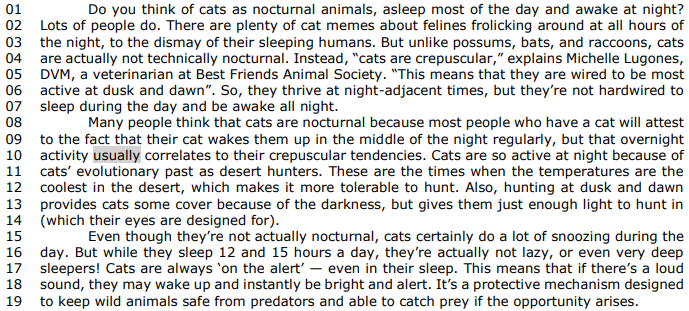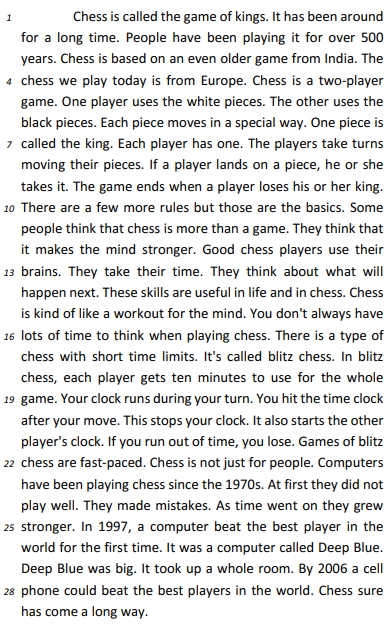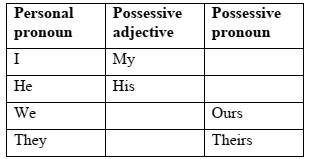Questões de Concurso
Sobre pronome possessivo substantivo | possessive pronoun em inglês
Foram encontradas 43 questões
I. Her aunt will be vacating next week.
II. That toy on the shelf is mine.
III. Did you do it yourself?
IV. She is the girl I was talking to you about.
V. I am going home today evening.
VI. All my friends are coming home for my birthday party.
In the order they were respectively underlined and written in bold letters, the pronouns written in the sentences above have specific functions, check the answer whose pronouns types are correspondent to the ones read above.
A - Is that notebook _______ (your/yours)? B - I encountered _____ (his/theirs) sister at the park last Sunday, can you believe it? C - Has Lucy seen ___ (my/mine) coat?
In the order presented, the gaps are correctly and respectively filled by:
Text 1
Youth and Adult Literacy in Brazil:
learning from practice
The Concept of functional ILLITERACY
[…] A person is considered functionally literate ..................... he or she is capable ................. using reading and writing skills ........................ meet the demands of his or her social context, using them to continue learning and developing over their lifetimes. With the expansion of the access to schooling beyond literacy, the focus was shifted to the quality of the educational process offered to all. The issue here is not simply whether people know how to read or write, but what they are capable of doing with those skills. This means that, besides the issue of illiteracy, a social problem that still persists in Brazil, there is also the issue of functional illiteracy; in other words, the inability to effectively use reading and writing skills in the various areas of social life after a certain number of years of schooling. According to census criteria, individuals with less than 4 years of schooling are considered functionally illiterate. […]
Source: https://unesdoc.unesco.org
Study these sentences below and decide if they are true ( T ) or false ( F ), according to structure and use of grammar and lexical aspects of language use.
( ) The words in bold, them and their in text 1, are respectively an object pronoun and a possessive adjective.
( ) In the sentence: The issue here is not simply whether people know how to read or write… the underlined word whether can be replaced by if without changing its meaning.
( ) The noun criteria in: According to census criteria, individuals with less than 4 years of schooling are considered functionally illiterate; is the singular form of criterium.
( ) In the following sentence from text 1: … the inability to effectively use reading and writing skills in the various areas of social life after a certain number of years of schooling; the underlined words reading, writing and schooling are examples of present participle.
Choose the alternative which presents the correct sequence, from top to bottom.
The author mentions a necklace and a bracelet, both of which belong to her grandmother.
She wants to express this in a clear and grammatically correct way.
How should she write about these belongings using possessive pronouns or the genitive case?
Read the following passage:
'Sally's cat is very playful. It loves to chase after ____ tail and play with ____ toys. ____ bed is soft and comfortable, and it always sleeps in it at night.'
Julgue o item subsequente.
Possessive nouns, expressing ownership or association,
play a vital role in sentence structure. Understanding how
to form possessives, whether through apostrophes or
other constructions, ensures grammatical accuracy.
Proficiency in handling possessive nouns contributes to
clear and effective communication in written and spoken
English.
Julgue o item subsequente.
Subordinate clauses, also known as dependent clauses,
are introduced by subordinating conjunctions such as
“although,” “because,” or “while.” These clauses provide
additional information and cannot stand alone as
complete sentences. Proficiency in using subordinate
clauses enhances sentence complexity, enabling the
conveyance of intricate relationships and details in
American English.

The Amazon Forest
The Amazon is often called the lungs of the earth and produces 20% of the world’s oxygen. For this reason, many people are trying to stop deforestation in the rainforest. Brazil, for example, is working hard to help the rainforest survive.
A few years ago, the Brazilian government put forward a plan called ARPA (Amazon Region Protected Areas). It had the support of many international agencies, including the World Bank, and the German Development Bank, KfW. The main aim was to build new areas of protected rainforest, maintain areas of the rainforest that hadn’t yet been destroyed, and stop deforestation. Deforestation contributes greatly to global warming because carbon dioxide is released into the atmosphere when trees get cut down and burned.
One of the first areas to be recognized as part of ARPA was the Tumucumaque Mountains National Park. It is 38,800 km2 and is the same size as Switzerland, a small country in Central Europe. It’s the world’s largest protected tropical national park, and the second largest national park. It is home to certain species of jaguar, eagle, and lizard, which can only survive in the rainforest. Many of these species are under threat from climate change and deforestation.
In order to work in the park, conservationists need
a reliable map. However, no map existed, and they
didn’t have enough knowledge to make one on their
own. They came up with the idea of involving local
tribes to help them, combining modern and ancient
methods to produce a map. The tribes learned to use
global positioning system handsets (GPS), in conjunction with their local knowledge of the area, which
included fishing and hunting grounds, and places of
historical or mythical importance. Aerial photos were
a 20useful aid in the process as well. This method of
map-making is now the key to the future of rainforests,
in Brazil and the rest of the world too.

Internet: <www.nortechplus.com>.
Observe a tabela a seguir:

Assinale a alternativa que preenche corretamente os espaços em branco na tabela acima: